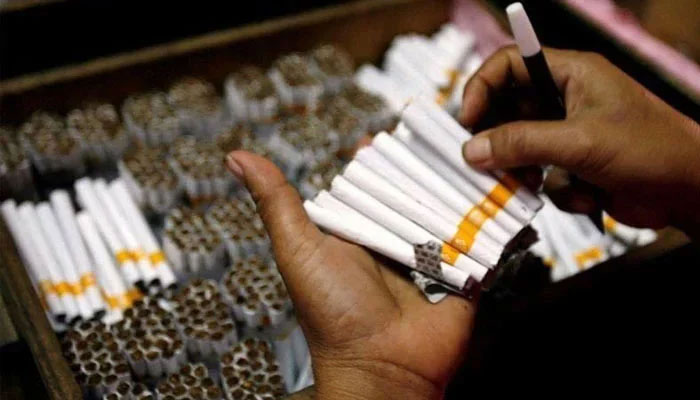Tobacco an industry designed to kill half its users
Islamabad:Experts, policymakers and academics stressed the need for urgent reforms in taxation and regulations as the tobacco industry continues to sidestep enforcement, target youth and dilute anti-smoking efforts.
The roundtable spotlighting Pakistan’s faltering tobacco control efforts was organised here by Sustainable Development Policy Institute (SDPI) in collaboration with Vital Strategies on Fr hosted a high-stakes roundtable spotlighting Pakistan’s faltering tobacco control efforts here. Dr Waseem Iftikhar Janjua, SDPI Advisor, unpacked the complex dynamics of Pakistan’s tobacco taxation, citing deliberate strategies by the tobacco industry such as differential shifting, overpricing, brand diversification and down-trading to maintain consumer addiction and evade taxes.
The industry is exploiting the lack of regulations, especially in e-cigarettes and nicotine pouches, he said, adding that there's a consistent failure to enforce policy due to limited capacity and regulatory ambiguity. He further said that the fight against tobacco is evolving. We are up against an industry designed to kill half its users—and it’s targeting our youth.”
Muhammad Asif Iqbal, Managing Director of SPDC, stressed the need for simplified, single-tier tobacco taxation to curb manipulation. “The primary goal of tobacco taxation should be to reduce consumption, especially among the youth,” he said. “The multi-tier tax system creates loopholes, enabling the industry to introduce variants and mislead both regulators and consumers.”
Dr Farah Rashid from NUST warned of alarming trends in youth smoking, with nicotine use starting as early as primary school. The issue, she stressed, is compounded by increasing exposure to unregulated products and targeted advertising. Dr Waseem Saleem of WHO’s MPOWER initiative critiqued Pakistan’s inconsistent approach to tobacco control, likening it to two steps forward and four steps back.
-
 Michael B. Jordan Gives Credit To 'All My Children' For Shaping His Career: 'That Was My Education'
Michael B. Jordan Gives Credit To 'All My Children' For Shaping His Career: 'That Was My Education' -
 Sun Appears Spotless For First Time In Four Years, Scientists Report
Sun Appears Spotless For First Time In Four Years, Scientists Report -
 Bella Hadid Opens Up About 'invisible Illness'
Bella Hadid Opens Up About 'invisible Illness' -
 Lawyer Of Epstein Victims Speaks Out Directly To King Charles, Prince William, Kate Middleton
Lawyer Of Epstein Victims Speaks Out Directly To King Charles, Prince William, Kate Middleton -
 Microsoft CEO Shares How Gates Doubted $1bn OpenAI Investment
Microsoft CEO Shares How Gates Doubted $1bn OpenAI Investment -
 Milo Ventimiglia Calls Fatherhood 'pretty Wild Experience' As He Expects Second Baby With Wife Jarah Mariano
Milo Ventimiglia Calls Fatherhood 'pretty Wild Experience' As He Expects Second Baby With Wife Jarah Mariano -
 Chinese Scientists Unveil Advanced AI Model To Support Deep-space Exploration
Chinese Scientists Unveil Advanced AI Model To Support Deep-space Exploration -
 Anthropic’s New AI Tool Wipes Billions Off Cybersecurity Stocks
Anthropic’s New AI Tool Wipes Billions Off Cybersecurity Stocks -
 Trump Announces He Is Sending A Hospital Ship To Greenland Amid Rising Diplomatic Tensions
Trump Announces He Is Sending A Hospital Ship To Greenland Amid Rising Diplomatic Tensions -
 'Never Have I Ever' Star Maitreyi Ramakrishnan Lifts The Lid On How She Avoids Drama At Coffee Shops Due To Her Name
'Never Have I Ever' Star Maitreyi Ramakrishnan Lifts The Lid On How She Avoids Drama At Coffee Shops Due To Her Name -
 Inside Prince William’s Plans For Prince Harry: What Will Happen To Duke Once He’s King
Inside Prince William’s Plans For Prince Harry: What Will Happen To Duke Once He’s King -
 Chyler Leigh Pays Moving Homage To 'Grey’s Anatomy' Co-star Eric Dane: 'He Was Amazing'
Chyler Leigh Pays Moving Homage To 'Grey’s Anatomy' Co-star Eric Dane: 'He Was Amazing' -
 Did You Know Tech CEOs Limit Screen Time For Their Own Kids?
Did You Know Tech CEOs Limit Screen Time For Their Own Kids? -
 Matthew Lillard Admits Fashion Trends Are Not His 'forte'
Matthew Lillard Admits Fashion Trends Are Not His 'forte' -
 SpaceX Launches Another Batch Of Satellites From Cape Canaveral During Late-night Mission On Saturday
SpaceX Launches Another Batch Of Satellites From Cape Canaveral During Late-night Mission On Saturday -
 Princess Beatrice, Eugenie Get Pulled Into Parents’ Epstein Row: ‘At Least Stop Clinging!’
Princess Beatrice, Eugenie Get Pulled Into Parents’ Epstein Row: ‘At Least Stop Clinging!’




